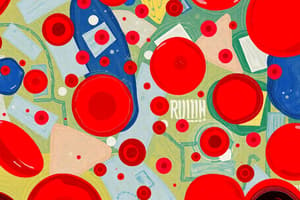Podcast
Questions and Answers
What is the average lifespan of erythrocytes in the human body?
What is the average lifespan of erythrocytes in the human body?
- 180 days
- 60 days
- 120 days (correct)
- 90 days
Which type of white blood cell is the most abundant in the bloodstream?
Which type of white blood cell is the most abundant in the bloodstream?
- Basophils
- Monocytes
- Eosinophils
- Neutrophils (correct)
What protein is responsible for the red color of erythrocytes?
What protein is responsible for the red color of erythrocytes?
- Keratin
- Hemoglobin (correct)
- Myoglobin
- Collagen
Leucocytes are characterized by which of the following features?
Leucocytes are characterized by which of the following features?
Which white blood cell type secretes histamine and is involved in inflammatory reactions?
Which white blood cell type secretes histamine and is involved in inflammatory reactions?
The fluid that surrounds cells and is derived from blood is known as what?
The fluid that surrounds cells and is derived from blood is known as what?
What is the average concentration of erythrocytes in a healthy adult man's blood?
What is the average concentration of erythrocytes in a healthy adult man's blood?
Which of the following is not a type of white blood cell?
Which of the following is not a type of white blood cell?
What fluid is collected by the lymphatic system?
What fluid is collected by the lymphatic system?
Which organisms possess an open circulatory system?
Which organisms possess an open circulatory system?
Which type of circulatory system allows for precise regulation of fluid flow?
Which type of circulatory system allows for precise regulation of fluid flow?
What type of heart do fishes possess?
What type of heart do fishes possess?
In amphibians and reptiles, how is blood managed in their circulatory system?
In amphibians and reptiles, how is blood managed in their circulatory system?
What distinguishes the circulatory system in birds and mammals from that of amphibians and reptiles?
What distinguishes the circulatory system in birds and mammals from that of amphibians and reptiles?
What is the role of lymphocytes in the lymphatic system?
What is the role of lymphocytes in the lymphatic system?
Where are fats primarily absorbed in the lymphatic system?
Where are fats primarily absorbed in the lymphatic system?
Flashcards
Red blood cells (RBCs)
Red blood cells (RBCs)
The most abundant type of formed element in blood, responsible for oxygen transport.
Hemoglobin
Hemoglobin
A protein found in red blood cells that binds to oxygen and carries it throughout the body.
White blood cells (WBCs)
White blood cells (WBCs)
Cells in the blood that fight infections and protect the body from foreign invaders.
Neutrophils
Neutrophils
Signup and view all the flashcards
Eosinophils
Eosinophils
Signup and view all the flashcards
Basophils
Basophils
Signup and view all the flashcards
Monocytes
Monocytes
Signup and view all the flashcards
Platelets
Platelets
Signup and view all the flashcards
What is lymph?
What is lymph?
Signup and view all the flashcards
What is the lymphatic system?
What is the lymphatic system?
Signup and view all the flashcards
What is a closed circulatory system?
What is a closed circulatory system?
Signup and view all the flashcards
What is an open circulatory system?
What is an open circulatory system?
Signup and view all the flashcards
What is single circulation?
What is single circulation?
Signup and view all the flashcards
What is double circulation?
What is double circulation?
Signup and view all the flashcards
What is incomplete double circulation?
What is incomplete double circulation?
Signup and view all the flashcards
What is complete double circulation?
What is complete double circulation?
Signup and view all the flashcards
Study Notes
Formed Elements of Blood
- Erythrocytes (red blood cells, RBCs) are the most abundant blood cells
- Healthy adult males have 5-5.5 million RBCs per mm³ of blood
- RBCs are produced in red bone marrow
- Mature RBCs lack a nucleus and are biconcave
- RBCs contain hemoglobin, an iron-containing protein that gives them their red color and facilitates respiratory gas transport.
- Healthy individuals have 12-16 grams of hemoglobin per 100 ml of blood
- RBCs have a lifespan of 120 days and are destroyed in the spleen
- Leucocytes (white blood cells, WBCs) are colorless due to lack of hemoglobin
- Average WBC count is 6000-8000 per mm³ of blood
- WBCs are nucleated and generally short-lived
- WBCs are categorized into granulocytes (neutrophils, eosinophils, basophils) and agranulocytes (lymphocytes, monocytes)
- Neutrophils are the most abundant WBC type (60-65%)
- Basophils are the least abundant WBC type (0.5-1%)
- Neutrophils and monocytes are phagocytic, defending against foreign organisms
- Basophils release histamine, serotonin, and heparin, involved in inflammation
- Eosinophils resist infections
Body Fluids and Circulation
- Interstitial fluid is the fluid between cells, formed from blood plasma, enabling nutrient/gas exchange between blood and cells
- Lymph is formed from interstitial fluid
- The lymphatic system collects and returns interstitial fluid to the blood
- Lymph contains lymphocytes, crucial for immune responses
- Lymph also transports nutrients and hormones
- Fats are absorbed into the lymphatic system via lacteals in the intestinal villi
Circulatory Pathways
- Circulatory systems can be:
- Open (blood pumped into body cavities) found in arthropods and mollusks
- Closed (blood always contained in vessels) found in annelids and chordates
- All vertebrates have a muscular, chambered heart
- Fish have a 2-chambered heart (single circulation)
- Amphibians and most reptiles possess a 3-chambered heart (incomplete double circulation)
- Crocodiles, birds, and mammals have a 4-chambered heart (double circulation)
- Mammals and birds have a double circulatory system where oxygenated and deoxygenated blood don't mix
Studying That Suits You
Use AI to generate personalized quizzes and flashcards to suit your learning preferences.




